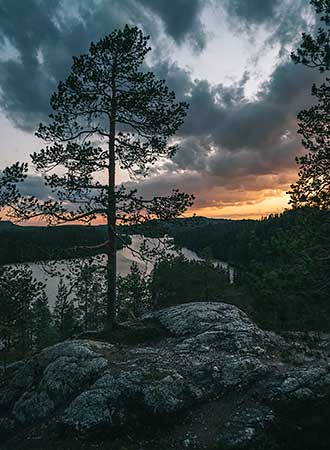Nature Energises Us – But Only If We Respect It And Avoid Littering
 Unspoilt nature and scenic hiking trails are a source of immeasurable richness. When you go outdoors and wander down a trail, admire the scenery and enjoy walking in an environment where the human footprint is very light, it is easy to lose your everyday cares and find that you go home invigorated by your excursion.
Unspoilt nature and scenic hiking trails are a source of immeasurable richness. When you go outdoors and wander down a trail, admire the scenery and enjoy walking in an environment where the human footprint is very light, it is easy to lose your everyday cares and find that you go home invigorated by your excursion.
However, in order to enjoy and foster pristine nature, we must always also carry our responsibility for keeping the environment clean. Litter-free hiking is one of the mainstays of keeping nature clean and the leading principle of national parks and hiking areas.
Hiking can have impacts on the environment
As hiking becomes ever more popular, the traces hikers leave in nature also build up. Litter left lying around degrades very slowly and is highly detrimental to the environment. We must all be aware of minimising the traces we leave in nature. Luckily, however, reducing the environmental impacts of hiking and curbing litter is very easy and can be achieved through simple steps.
Did you know that a cigarette butt, for example, is estimated to take full ten years to decompose in the ground? Even a tissue takes a year or two to break down, and plastic bag clips, which are only too often found in nature, will take hundreds of years to degrade.
The time it takes for many other types of litter found in nature to degrade is even longer; in the worst case, it may take hundreds if not thousands of years. Consequently, there is no excuse for leaving behind anything which does not belong in nature and which will take more than our lifetime to disappear. See the tips below for easy ways of reducing litter.
How does litter-free hiking work in practice and what does it mean?
The principle of litter-free hiking is simple. As we enjoy nature, we do not wish to leave any traces behind or bring out anything that we would not also have the energy to carry home. Quite simply, each hiker must always bring their own litter home. The aim is to minimise all traces we leave in nature to preserve the beautiful landscapes for other hikers and future generations without spoiling them. When we pick up after ourselves and take home everything we brought out, others will be able to enjoy nature at its best, litter-free and clean.
Litter bins are rarely available on the trails in national parks or hiking areas, as their presence has been found to exacerbate the litter problem rather than reduce it. However, you can often find well-equipped waste collection points at the starting points or parking areas of hiking trails. You can either recycle your waste at these points or bring your rubbish home and recycle it appropriately there.

Preparation for litter-free hiking begins with simple steps at home
When you are planning to go on an outing, discard unnecessary wrapping when packing your rucksack. When you are buying and packing your food, you should favour environmentally friendly and reusable packaging as far as possible. Many hikers use not only containers with lids but also sustainable resealable freezer bags for carrying their food in, as this type of packaging can also be easily reused!
You should leave home all unnecessary packaging components and recycle them appropriately. When your rucksack is light enough and you bring a bag to put your rubbish in, it will be easy to pop all your waste in a bag and take it home to be recycled. When you have taken your time to sort out the packaging at home, the rubbish from even a week-long hike can easily fit in a single one-litre resealable freezer bag.
While some destinations have recycling or waste collection points, valuable resources can be saved for maintaining the hiking areas and developing other services if you take your waste home for recycling, eliminating the need for frequent service visits to the destinations. At the same time, we can also reduce soil erosion and emissions.
Even small acts can thus have major impacts, and looking after nature benefits both nature itself and all those who would enjoy it. Small steps can help save your own and other's resources and ensure that nature is preserved for future generations to enjoy.
Important principles of litter-free hiking
- Only leave biodegradable waste in a dry toilet. Many rest stops in national parks have composting toilets in which you can dispose of biodegradable waste and food waste.
- Only burn small quantities of clean paper or cardboard in a campfire. Never burn packaging that contains aluminium foil or metal in a campfire.
- Do not leave combustible waste in amongst the firewood or on the campfire sites for other hikers to deal with.
- Do not leave biodegradable waste in the waste bins, as it will become smelly and attract animals.
- Always take hazardous waste, including batteries, with you to an appropriate recycling point.
- Pick up your cigarette butts, they will not break down! You can easily pick up your butts, keep them in a special little box and dispose of them as waste when you get home.
- Tidy up after yourself and also others if possible to ensure that being outdoors is enjoyable for everyone.
